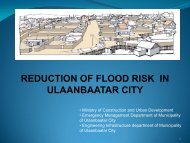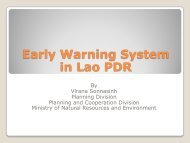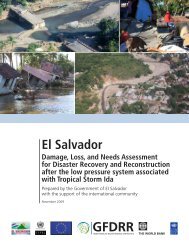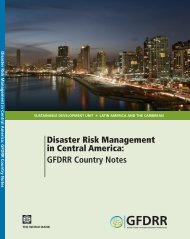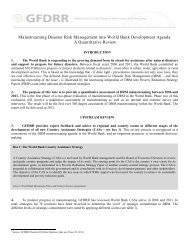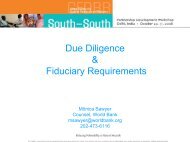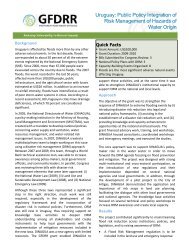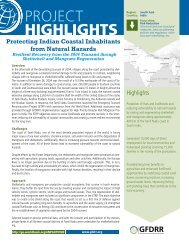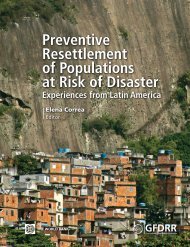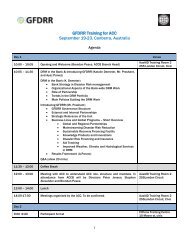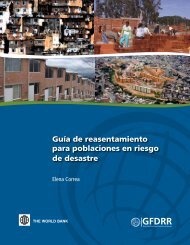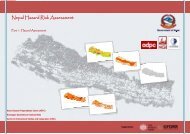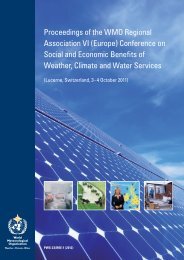Discussion Points on GFDRR Governance
Discussion Points on GFDRR Governance
Discussion Points on GFDRR Governance
You also want an ePaper? Increase the reach of your titles
YUMPU automatically turns print PDFs into web optimized ePapers that Google loves.
<str<strong>on</strong>g>Discussi<strong>on</strong></str<strong>on</strong>g> <str<strong>on</strong>g>Points</str<strong>on</strong>g> <strong>on</strong> <strong>GFDRR</strong> <strong>Governance</strong><br />
Introducti<strong>on</strong><br />
<strong>GFDRR</strong>’s current governance structure is defined in the Partnership Charter 2010. Since its<br />
first C<strong>on</strong>sultative Group (CG) meeting in September 2006, <strong>GFDRR</strong> has seen its membership<br />
grow from 14 countries and three internati<strong>on</strong>al organizati<strong>on</strong>s, to 41 countries and 8<br />
internati<strong>on</strong>al organizati<strong>on</strong>s. This has resulted in a less efficient decisi<strong>on</strong> making process with<br />
limited opportunities for interactive discussi<strong>on</strong>. This paper lays out proposals for<br />
c<strong>on</strong>siderati<strong>on</strong> of the CG to streamline <strong>GFDRR</strong>’s governance system to adapt to its growing<br />
portfolio and membership.<br />
1. Frequency of CG Meetings<br />
The Partnership Charter requires the CG to meet ‘at least <strong>on</strong>ce a year’ in pers<strong>on</strong>. In the past,<br />
the Secretariat has organized CG meetings twice a year with full plenary sessi<strong>on</strong>s. This has<br />
been a resource-intensive practice in terms of time, energy and financing.<br />
Two formal CG meetings per year is now less important, as <strong>GFDRR</strong> is well-established, and<br />
because as development projects usually take a number of years to implement, bi-annual<br />
reports cannot show significant changes from <strong>on</strong>e CG to the next.<br />
In this c<strong>on</strong>text, it is proposed that <strong>GFDRR</strong> c<strong>on</strong>duct <strong>on</strong>ly <strong>on</strong>e CG Meeting each year. This<br />
annual meeting, to take place during the last quarter of each calendar year, would discharge<br />
the duties and resp<strong>on</strong>sibilities of the CG as envisaged in Paragraph 25 of the Charter. The<br />
venue for the Annual CG meeting will c<strong>on</strong>tinue to be decided in c<strong>on</strong>sultati<strong>on</strong> with the Co-<br />
Chair.<br />
The Secretariat will c<strong>on</strong>tinue to organize an informal meeting in the Spring. However, this<br />
meeting would not make any formal decisi<strong>on</strong>s regarding <strong>GFDRR</strong>’s business and would serve<br />
to prepare the agenda for the Annual CG meeting. The Spring meeting could be organised in<br />
the margins of other internati<strong>on</strong>al events where members are already likely to attend. Such<br />
meetings would include the Chair and Co-chair, and be open to all interested members.<br />
Minutes of the spring meeting would be circulated to all members.<br />
This arrangement will be c<strong>on</strong>sistent with decisi<strong>on</strong>s at the 12th CG meeting regarding the<br />
<strong>GFDRR</strong> governance, where it was agreed that: “deliberative processes outside of the CG<br />
meeting should remain informal and within the existing provisi<strong>on</strong>s of the Charter, should<br />
allow all interested members to engage in the spirit of inclusiveness and transparency, and<br />
ensure that the <strong>GFDRR</strong> Head of Secretariat is fully involved”.<br />
1 | P a g e
Point for c<strong>on</strong>siderati<strong>on</strong>:<br />
Does the CG approve having <strong>on</strong>e Annual CG meeting to transact its business as per<br />
provisi<strong>on</strong>s of the Charter? This proposal does not require an amendment of the Charter,<br />
in terms of Paragraph 26.<br />
2. Number of invited members to the CG<br />
The Charter provides for the CG to invite developing countries as n<strong>on</strong>-c<strong>on</strong>tributing members<br />
<strong>on</strong> a 2-year staggered rotati<strong>on</strong> basis. A decisi<strong>on</strong> was taken at the 7 th CG in Stockholm to<br />
invite 6 developing countries as n<strong>on</strong>-c<strong>on</strong>tributing members of the CG <strong>on</strong> 2-year staggered<br />
rotati<strong>on</strong> basis. This decisi<strong>on</strong> was driven by the need to broaden the governance base of<br />
<strong>GFDRR</strong> and to increase the voice of developing countries in its governance.<br />
A number of developing countries have since joined or are about to join <strong>GFDRR</strong> as<br />
c<strong>on</strong>tributing members. To manage the growth of the CG, it is proposed that the number of<br />
n<strong>on</strong>-c<strong>on</strong>tributing low income countries to be invited by CG be set at two. This would <strong>on</strong>ly<br />
take effect at the end of the two-year term of current invited members (Solom<strong>on</strong> Islands,<br />
Togo and Haiti).<br />
Point for c<strong>on</strong>siderati<strong>on</strong>:<br />
Does the CG approve setting the number of n<strong>on</strong>-c<strong>on</strong>tributing invited low income<br />
countries to two <strong>on</strong> a two-year staggered-rotati<strong>on</strong> basis from 2014 <strong>on</strong>wards? This<br />
proposal does not require an amendment of the Charter, in terms of Paragraph 24(f).<br />
3. Results Management Council<br />
The Charter provides for a Results Management Council (RMC) to provide technical<br />
guidance and advice to the CG and the Secretariat. RMCs were set up for 2007-2009 and<br />
2010-2012. Over a dozen experts were nominated as members of the RMC in both the<br />
Councils.<br />
Although the RMC met regularly to provide guidance to the Secretariat (including <strong>on</strong> the<br />
Terms of Reference for the 2010 Independent Evaluati<strong>on</strong>, the Results Based Management<br />
System (RBMS) and the Results Framework), it has not lived up to the resp<strong>on</strong>sibilities<br />
originally envisaged in Paragraph 32 of the Charter. As the term of the RMC members was<br />
due to expire in 2011, the 11 th CG in Jakarta (November 2011) decided to refrain from<br />
rec<strong>on</strong>stituting it, pending overall governance enhancement decisi<strong>on</strong>s.<br />
It is proposed that the RMC not be rec<strong>on</strong>stituted as an entity, and that its tasks and<br />
resp<strong>on</strong>sibilities be met by commissi<strong>on</strong>ing experts to carry out studies <strong>on</strong> topics of interest to<br />
the CG, including assessments of approaches and programs. Such studies would be tabled,<br />
and results presented at the Annual CG meeting.
Point for c<strong>on</strong>siderati<strong>on</strong>:<br />
Does the CG approve this arrangement, which would c<strong>on</strong>sist of commissi<strong>on</strong>ing<br />
independent studies, in lieu of the RMC’s resp<strong>on</strong>sibilities? This would require an<br />
amendment of the Charter in Paragraphs 31 to 33. The language of such amendment will<br />
be circulated by email for approval.<br />
4. Secretariat’s authority for Project approval<br />
A recent review by the World Bank’s Internal Audit Department (IAD) noted inc<strong>on</strong>sistency<br />
in seeking no-objecti<strong>on</strong>s from the CG by the Secretariat for particular emergency operati<strong>on</strong>s.<br />
IAD has requested the Secretariat to work with the CG to define specific circumstances<br />
where no-objecti<strong>on</strong> from the CG will be obtained in the future.<br />
IAD noted that the <strong>GFDRR</strong> Secretariat sought the c<strong>on</strong>sent of the CG to sancti<strong>on</strong> funds for the<br />
purchase of disaster preparedness and emergency resp<strong>on</strong>se equipment (rescue boats) after the<br />
India floods of 2009, but did not seek similar authorizati<strong>on</strong> from the CG after the Pakistan<br />
floods of 2010. Neither of these operati<strong>on</strong>s was outside the principles of the Administrati<strong>on</strong><br />
Agreements.<br />
Point for c<strong>on</strong>siderati<strong>on</strong>:<br />
Does the CG agree that the Secretariat, in order to retain its ability to act quickly, will<br />
<strong>on</strong>ly seek CG’s clearance where a specific course of acti<strong>on</strong> requires an excepti<strong>on</strong> from<br />
the existing provisi<strong>on</strong>s of the Administrati<strong>on</strong> Agreements? This proposal does not require<br />
an amendment of the Charter, in terms of Paragraph 35.
ANNEX<br />
List of Members and Observers<br />
Formal CG Members:<br />
D<strong>on</strong>ors:<br />
ACP Secretariat<br />
Australia<br />
Austria<br />
Brazil<br />
Denmark<br />
European Uni<strong>on</strong><br />
Germany<br />
Italy<br />
Japan<br />
Korea, Republic of<br />
Luxembourg<br />
Norway<br />
Spain<br />
Sweden<br />
Switzerland<br />
The Netherlands<br />
United Kingdom<br />
United States<br />
World Bank<br />
Other members:<br />
UNISDR<br />
Invited Developing countries:<br />
Yemen (2011-12)<br />
Malawi (2011-12)<br />
Bangladesh (2011-12)<br />
Togo (2012-13)<br />
Solom<strong>on</strong> Islands (2012-13)<br />
Haiti (2012-13)<br />
CG Observers:<br />
Arab Academy<br />
Belgium<br />
Canada (d<strong>on</strong>or but 3-year c<strong>on</strong>tributi<strong>on</strong> expired)<br />
China<br />
Colombia<br />
Egypt<br />
Finland<br />
France (d<strong>on</strong>or c<strong>on</strong>tributi<strong>on</strong> under 3 milli<strong>on</strong>)<br />
India<br />
Ind<strong>on</strong>esia<br />
Ireland (d<strong>on</strong>or c<strong>on</strong>tributi<strong>on</strong> under 3 milli<strong>on</strong>)<br />
Islamic Development Bank<br />
Malaysia<br />
Mexico<br />
Nigeria<br />
New Zealand<br />
Portugal<br />
Saudi Arabia<br />
Senegal<br />
South Africa<br />
Vietnam<br />
Invited Observers:<br />
UNDP<br />
IFRC



